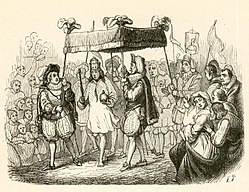"
The Emperor's New Clothes" (Danish:
Kejserens nye Klæder) is a short tale written by Danish author Hans Christian Andersen, about two weavers who promise an emperor
a new suit of clothes that they say is invisible to those who are unfit
for their positions, stupid, or incompetent. When the emperor parades
before his subjects in his new clothes, no one dares to say that they
don't see any suit of clothes on him for fear that they will be seen as
"unfit for their positions, stupid, or incompetent". Finally, a child
cries out, "But he isn't wearing anything at all!" The tale has been
translated into over 100 languages.
"The Emperor’s New Clothes" was first published with "The Little Mermaid" in Copenhagen, by C. A. Reitzel, on 7 April 1837, as the third and final installment of Andersen's
Fairy Tales Told for Children. The tale has been adapted to various media, and the story's title, the phrase "The Emperor has no clothes", and variations thereof have been adopted for use in numerous other works and as an idiom.

Plot
A vain emperor
who cares about nothing except wearing and displaying clothes hires two
weavers who promise him the finest, best suit of clothes from a fabric
invisible to anyone who is either unfit for his position or "hopelessly
stupid". The emperor's ministers
cannot see the clothes themselves, but pretend that they can for fear
of appearing unfit for their positions, and the emperor does the same.
Finally, the weavers report that the suit is finished, they mime
dressing him, and the emperor marches in procession before his subjects.
The townsfolk play along with the pretense, not wanting to appear unfit
for their positions or stupid. Then, a child in the crowd, too young to
understand the desirability of keeping up the pretense, blurts out that
the emperor is wearing nothing at all, and the cry is taken up by
others. The emperor suspects the assertion is true but continues the
procession.



No comments:
Post a Comment